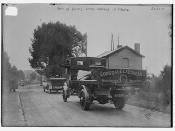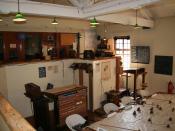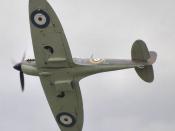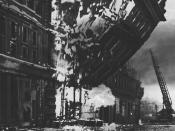My name is Lieutenant Rolph Gütemen. However I am going to recount to you, what really happened that cost us the Battle for Britain. I have included several of my own diary comments on the different stages throughout the battle.
It all started with the conquest of France and the Low Countries. The LuftwaffeÃÂs superior performance and machinery completely decimated the French Air Force. This granted to you a safe passage to Paris. A similar technique was to be used to destroy the Royal Air Force of Britain. The task; easy you might say, another link in the Golden chain of German Victory. Yet it wasnÃÂt to be, it ended badly, very badly; a shame of defeat, more chilling than the coldest Russian wind.
Dear Diary,23 June 1940France has fallen. Clearly itÃÂs threatÃÂs were false. The League of Nations has lost one of the jewels in its crown. A crown that is worn falsely for it had no right to treat Germany so.
I have been moved to the new Luftwaffe HQ in France for the next stage of our ultimate goal, the fall of Britain. With her will be the fall of the entire Western Sphere of Europe. What fools they were, to think that they could be a match for us. Soldiers and Pilots rejoice ÃÂHeil HitlerÃÂ. The British cower before us at Dunkirk; we chase them into the sea. They are morally defeated and Germany shall prevail.
Rolph GütemenThe tactic we used to defeat France was the same as the tactic we used in Poland and the Low Countries, the ÃÂlightning strikeàblitzkrieg. The tactic worked with spectacular results. France had fallen. England should have been an easy task. One difficulty we hadnÃÂt faced before was clearly evident; Britain was surrounded by water and had a large navy to defend it. The English Channel, although small, was a barrier to our advance westwards. A river crossing you might say, just larger and more deadly than any that we had yet faced.
The main problem with the invasion of England was its Navy. Because of the successful Norwegian Invasion, our Navy suffered greatly to obtain victory. The British forces though wounded by the Dunkirk evacuation were still strong enough to hinder our invasion.
The British had one other advantage that helped them to prevent our victory. The British had set up large, steel towers along its south eastern coastline. These were in fact towers that pricked up our aircrafts location and sent it back to Fighter Command HQ. A map is shown above that relays the low-level range and the high-level range of these towers. From espionage information we have gathered, the towers are difficult to destroy from the air, also most of the operating systems for the towers are underground. Goering ordered attacks on these towers early in the Battle of Britain. Limited success was achieved by these attacks.
Dear Diary,2nd August 1940Operation Eagle Attack has been announced by the German High Command. The Battle of Britain has begun. The first plans are being launched on attacks on the iron watchtowers on the 11 Group coastlines. Also attacks on RAF airfields in Southern England are being planned. Our boys in airfields stretching from Norway down to northern France are preparing for what should be another quick and easy victory for us. Heil Hitler.
Rolph GütemenOur Luftwaffe easily outnumbered theirs, 367 RAF Hurricanes and Spitfires compared to 702 of our Me 109s alone. The general tactic was set over a period of 13 days and was called Adlerangrif (Eagle Attack). This tactic was split into three phases: first five days attack west and move south and east in a radius of 90-60 miles of London; next three days attacks made in a radius of 60-30 miles of London; next five days attacks made within 30 mile radius of London. Luftwaffe forces 2 and 3 were assigned to this attack. The attacks began on the thirteenth of August 1940.
The RAF was the largest adversary that we had faced in the course of the war. However that summer our objective for the total destruction of the RAF was being achieved, and fast. Although there were extremely high casualties on Luftwaffe planes, we were putting the RAF into a desperate situation. However once again, Goering changed his mind.
In September 1940, the British performed the fist cowardly attack on the city of Berlin. A single airstrike against our capital caused yet another change of tactics. As punishment and for German retribution, Goering ordered a massive bomber force escorted by six hundred fighters to bombard the British Capital into submission, breaking the will and defiance of the people there and bringing a quick end to the war. Intelligence sources close to Neville Chamberlain and other politicians say that they were considering a peace treaty with us. But the arrogant and obnoxious Prime Minister, Winston Churchill, would not consider it.
Dear Diary,31st August 1940,I hate the British. They have bombed Berlin during an air-raid a few nights ago. The unprovoked terror that the British have unleashed in Berlin is totally unforgiveable. Goering at last has seen the light. The only way to subdue the people of Britain will have to be one thing; the bombing of their capital, London, into the ground. The Luftwaffe shall bomb the city of London back into the Middle Ages. It is not Germany that is to blame for this, but the British have brought this fate upon themselves by targeting the civilians of Germany.
Rolph GütemenThis diary entry, though written with strong emotion, is the evidence of the next stage of the Battle of Britain and the progression into the Blitz. The city of London burned with wave upon wave of attacks occurring everyday, the first having 650 bombers and over 1000 fighters. Yet still Churchill refused to surrender. However as the bombing of London continued, some great danger had suddenly been unleashed. Although great damage had been dealt on the RAF, which we thought had at last been mortally wounded, they were still alive. And with everyday of phenomenal damage ripping through London, the RAF was growing stronger. Everyday this strength developed, more and more of our precious bombers were being destroyed, shot down over London, the English countryside, the English Channel, the North Sea. Casualties were high.
Then the orders came from Berlin, from you. Operation Sea Lion has been indefinitely postponed. The main purpose for the attacks on the RAF was gone. There was no need to continue to destroy them. Although it was not obvious, this was GermanyÃÂs first defeat of the war. The Battle for Britain was over.
If the bombing raids had continued on the RAF airfields, supply factories and watchtowers, the Battle of Britain could have just as easily been turned in our favor. The Germans should have been victorious. The London bombings were too little focused on and the same was for the RAF. We needed to focus on one objective rather than divide the force.
Germany has not been defeated yet. We will return after the surrender and annihilation of the Soviet Front. I vow that we shall return. The Battle of Britain has only been postponed. The battle is fought and the victory shall be won.
(Note: Rolph Gütemen is a fictional character. Events are real though as expressed through the first person.)Information Websites:http://www.ibiblio.org/hyperwar/ETO/BOB/BoB-German/index.htmlAuthor: Lt Col Earle Lund, USAF Joint Doctrine Air Campaign Course Campaign Analysis Study,24th January 1996http://www.internationalschoolhistory.net/BHP/history/battle_britain.htmAuthor: Rudolf Kral, British International School of Bratislava, 2005http://www.raf.mod.uk/Bob1940/bobhome.htmlAll Crown Copyright images and text remain property of the Crown.
Design Copyright DeltaWeb International Ltd.
All original material Copyright DeltaWeb International Ltd. 2004http://helena-schrader.com/bob.htmlAuthor: Dr. Helena Schrade, 2007Books: Military Air PowerAuthor: Kenneth Mudsen & John William Randsom Taylor, New English Library, 1975





